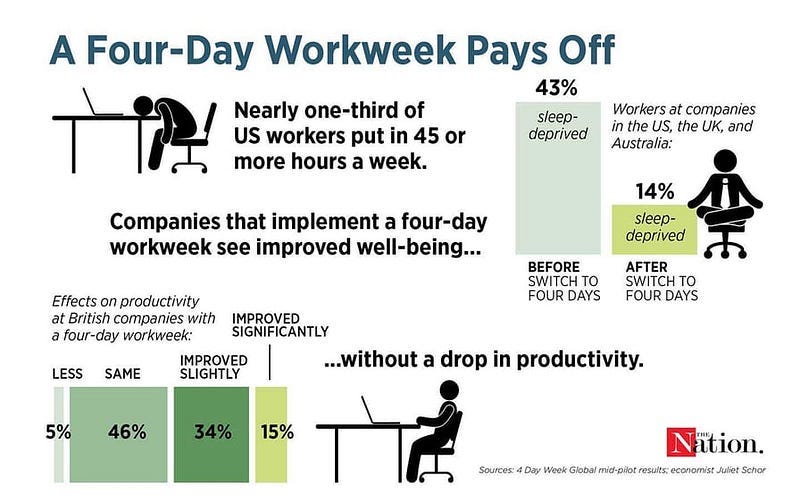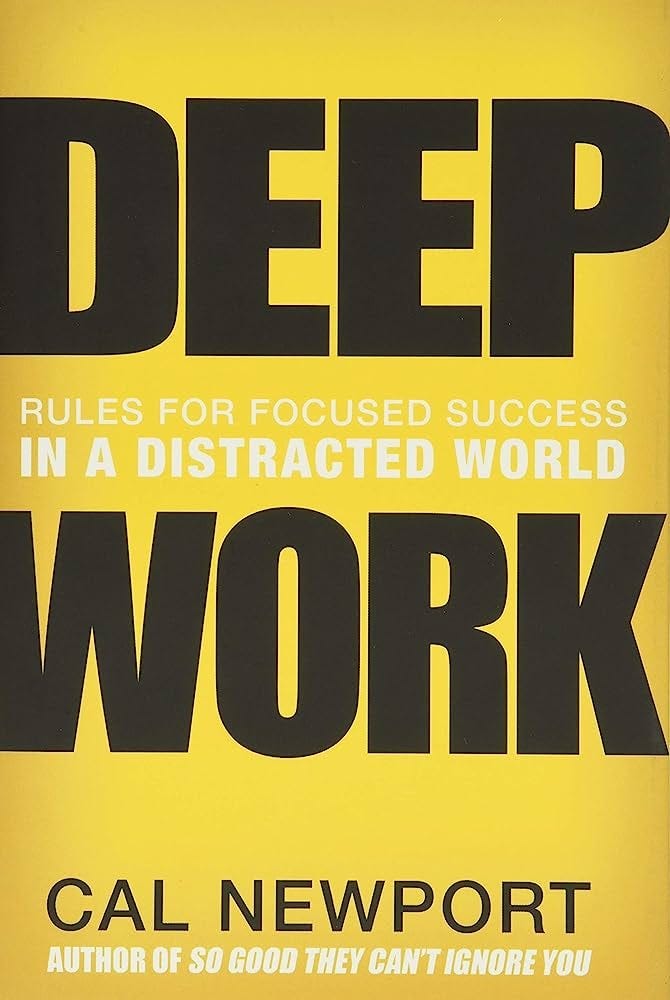A 4-day week - A Scrum Master Experience
It sounds like a free day, but that is not it. It is actually even better than that.
For most of my life, I’ve pursued the luxury of a 4-day week. In practice, that means I sacrificed my salary to pay for the extra free day. For me, it was totally worth it, because, beyond the fact that I got one more day to enjoy freedom, it also made work more enjoyable.
My extra free day was of course preferably Friday, giving me a long weekend, and I definitely treated it like a weekend day: completely free with no thought of work.
This got a bit more challenging as my daughters came along and my wife stopped working, so eventually I went back to a 5-day week. The contrast was undeniable. The weekends seemed to fly by, leaving me feeling like I barely got a chance to recharge. And it affected my work too. Don’t get me wrong, I love my work, but even so, I noticed that my energy levels were lower and that my brain slowed down significantly. Especially Fridays felt like a survival day, just trying to get through.
Everything changed when I joined my current company. This is a company that has adopted a 4-day week, and I’m talking about the real thing here. No trying to cram 10 hours into the remaining 4 days, or reducing salary proportionally, or anything like that. My company is driven by the genuine belief that people are more effective working 4 days a week.

Leadership will literally tell me off if I work on Friday, or if I put in too much overtime. I know this intimately because when I started with my first assignment, I also got an extra gig doing workshops once a month. Naturally, I planned those on Fridays. As soon as leadership found out they told me to plan my workshops any other day, but not Fridays. They took pains to explain to me the purpose of the 4-day week. And I must confess they were right. Every time I worked on Friday, it had an impact on my weekend and the week after that.
The value of a 4-day week
But what makes the 4-day week special? What makes it more than just a free day?
The really interesting part about the 4-day week is that the extra free day does not actually feel like a free day. Sure, I still get to relax and I have no serious obligations, but somehow it is a day I never take for granted. Certainly not like the way I did when I sacrificed my salary for it.
Maybe it is because I’m being paid for that day. Perhaps it is because my daughters are at school, so the house is peaceful. Or maybe it is because, after a hectic 4 days of work, it is just such a privilege to have a whole day to consolidate and ruminate.
Whatever the case, it is a day where I will just generally give my brain space to think properly, outside the hamster wheel of normal working life. I will take a long walk. Go for a run, or swim laps. Or just simply sit with a coffee mug and let my brain hum in the background.
Often I will also reserve time for writing, or for preparing workshops, but that is usually secondary to the feel of the day.
And it is not just me. Friday colleagues will often gather at the office, just to catch up with each other. We will hang around and talk about our work. Discuss our approaches, give each other suggestions. To discuss how we are running the company. Or just have some quality time together. Letting the unconscious work the problem.
The impact is huge. I have my best insights on that day. I will see patterns that remain hidden during the rest of the week. As the urgency and stress fall away, I will give myself room to get my overview back. Big problems I’m struggling with will suddenly come into focus, and I will find that one big thing I need to do to make it all work out.
The result is that I feel more confident in my work. I’m also much more productive. But maybe the best part is that I neatly ‘park’ my work for the weekend so that I enjoy it much more, recharge better, and Mondays I feel I have a running start.

In a sense, the paid free day has a similar purpose as the Retrospective in Scrum. It is the moment we stop with the daily drudgery, step back, and really focus on finding that one huge improvement, that crazy experiment that will maybe change the system.
You see, every system has a maximum velocity. The only way to improve beyond that maximum velocity is to change the system. Take SpaceX as an example. By making the crazy idea of reusing boosters a reality (amongst other things). SpaceX changed the system in such a way that it makes it ten times more efficient than other space companies!
The problem is that making these kind of radical changes takes a lot of creativity. It takes space in your head to think deeply about things. And this is not the state of mind that our daily work encourages.
The very excitement of day-to-day work preps us to a very effective state of mind to deal with that hectic activity, involving fight-or-flight hormones. It makes us decisive, fast, and impatient. But this is a state of mind which is hopeless for creativity and deep thought.
Creativity requires something different, and often quite counterintuitive, involving things like boredom, exercise, a good mood, mindfulness, play, solitude. My free day allows me to experiment with these ideas and create a better environment for myself to be creative.

The key is to realise there are two kinds of work.
First, there is what I would call production work, geared at getting things done and delivering results. Writing the code is production work, as is checking your e-mails.
Second is what I would call creative work, which is basically what happens before we go into production work. Thinking about how and why to write the code, that is creative work. Thinking about how to avoid having to read e-mails too.
As a society, we tend to focus on production work. That is simply the way we do things, how we have decided to organise ourselves since the origins of organisation in the industrial revolution. But in our times we are reaching the maximum velocity of that kind of work.
Perhaps this is the most fundamental change that Agile brings, that of bringing creative work to the fore. Continuously taking the time to think about things, improving the way we do things.
It’s not called knowledge work for nothing. In fact, I often tell my Scrum Teams that it is during the events that we really do our work — figuring out why and what we are doing. That is the creative work. The better we do that work, the easier the production part is. It becomes more like a game.
Conclusion
For me, it still feels quite ironic that often the one day I do not work, I do my best work.
It has led me to rethink my approach to work. I find myself more and more often seeking that free-working-day mindset during my regular working days, taking steps to secure special thinking time, especially when I feel stressed. I try to have a walk every day and often force myself to stop what I’m doing, take a deep breath, and just think.
The challenge is that creative work is easy to forget. As I said, our whole society is focused on production work — we are simply not used to valuing creative work.
And that is where the 4-day work week comes in. Just like the Scrum framework provides a structure for an Agile approach, the 4-day week provides a structure to teach us to focus on creative work.


